Two brothers who played central roles in what Chicago police say was a staged racist and homophobic attack on Jussie Smollett are, compared to the "Empire" actor, so far walking away legally unscathed.
Police outlined their case against the 36-year-old actor at a news conference on Thursday, saying he paid the two brothers $3,500 to help him stage a bigoted attack against him early on Jan. 29 in downtown Chicago. Police say Smollett sought to drum up publicity for himself and was unhappy about his salary.
Although authorities detailed the parts Abimbola "Abel" and Olabinjo "Ola" Osundairo played in the alleged hoax, the head of the police department said Smollett "choreographed" the staged attack and that the Osundairos aren't considered suspects in the case.
Here's a look at why they may be off the hook:
Q: DIDN'T THE BROTHERS COMMIT A CRIME DURING THE ALLEGEDLY STAGED ATTACK?
A: Not necessarily. However odd a request, you wouldn't be breaking the law by asking people to pretend to beat you up. If that was as far it went, there would be no victims.
It would be a crime to report such a beating to police as a real attack, as authorities allege Smollett did. The victim in such a case would be the police, who wasted their time investigating the phony attack.
Smollett, who is black and gay, was charged under Illinois' disorderly conduct statute because prosecutors allege he staged the attack but portrayed it as real. Smollett reported that two masked men beat him, used racist and homophobic slurs, doused him in a chemical substance and draped a noose around his neck before fleeing. He also said they yelled "This is MAGA country" — an apparent reference to President Donald Trump's campaign slogan, "Make America Great Again."
Q: COULD ANYTHING THE BROTHERS DID BEFORE OR AFTER THE ATTACK BE A CRIME?
A: Possibly, said Gal Pissetzky, a Chicago-based defense attorney.
If they knew in advance that Smollett planned to call police to pass off the hoax as real and that the aim was to pressure Smollett's employers for a higher salary, Pissetzky said that could open them up to a charge of conspiracy.
But prosecutors may see such a charge as overkill for an incident that didn't result in major damages or injuries to anyone, even if it generated negative publicity for the city. Police say scratches on Smollett's face were likely self-inflicted.
"I don't think they are going to bother spending resources on charging them," Pissetzky said of the brothers. "They would rather get the big fish, Smollett."
Q: IS THE BROTHERS' COOPERATION A FACTOR IN THEM NOT FACING CHARGES?
A: Authorities haven't said if they promised the brothers they would not be charged if they cooperated. However, police Superintendent Eddie Johnson said Thursday that much of the evidence that made it possible to charge Smollett came from interviewing the brothers. That cooperation is almost certainly the main reason they haven't been charged.
They didn't open up to police right away.
According to Johnson, the American-born brothers left for Nigeria shortly after the staged attack and were detained Feb. 13 upon arriving back in Chicago. It was only after 46 hours behind bars that they agreed to talk, later admitting they helped stage the attack and offering details on how it was done.
Johnson said that if the brothers had held out and refused to speak for another two hours, reaching their 48th hour in custody, police would have had to release them and authorities might still not have reached the stage of charging anyone.
Q: WHAT ABOUT THEIR GRAND JURY TESTIMONY?
A: Police say the brothers were taken before a grand jury so their testimony could be "locked in." Defense lawyers say that refers to the practice of taking witnesses — especially reluctant ones — before a grand jury to get them to say everything they know under oath before they can even think about changing their minds.
Bringing the Osundairo brothers before the grand jury accomplished at least two things, Pissetzky explained.
First, it gives prosecutors the option of charging or threatening to charge them with lying to a grand jury if it ever looks like they might try to recant their statements about Smollett. Secondly, if they do recant, say, at a future Smollett trial, prosecutors could be permitted to read their grand jury testimony to trial jurors to challenge any contradictory testimony.
UNITED NATIONS (AP) — The United States vetoed a widely backed U.N. resolution Thursday that would have paved the way for full United Nations membership for Palestine, a goal the Palestinians have long sought and Israel has worked to prevent.
The vote in the 15-member Security Council was 12 in favor, the United States opposed and two abstentions, from the United Kingdom and Switzerland. U.S. allies France, Japan and South Korea supported the resolution.
The strong support the Palestinians received reflects not only the growing number of countries recognizing their statehood but almost certainly the global support for Palestinians facing a humanitarian crisis caused by the war in Gaza, now in its seventh month.
The resolution would have recommended that the 193-member U.N. General Assembly, where there are no vetoes, approve Palestine becoming the 194th member of the United Nations. Some 140 countries have already recognized Palestine, so its admission would have been approved, likely by a much higher number of countries.
U.S. deputy ambassador Robert Wood told the Security Council that the veto “does not reflect opposition to Palestinian statehood but instead is an acknowledgment that it will only come from direct negotiations between the parties."
The United States has “been very clear consistently that premature actions in New York — even with the best intentions — will not achieve statehood for the Palestinian people,” deputy State Department spokesman Vedant Patel said.
His voice breaking at times, Palestinian U.N. Ambassador Riyad Mansour told the council after the vote: “The fact that this resolution did not pass will not break our will and it will not defeat our determination.”
“We will not stop in our effort,” he said. “The state of Palestine is inevitable. It is real. Perhaps they see it as far away, but we see it as near.”
This is the second Palestinian attempt for full membership and comes as the war in Gaza has put the more than 75-year-old Israeli-Palestinian conflict at center stage.
Palestinian President Mahmoud Abbas first delivered the Palestinian Authority’s application for U.N. membership in 2011. It failed because the Palestinians didn’t get the required minimum support of nine of the Security Council’s 15 members.
They went to the General Assembly and succeeded by more than a two-thirds majority in having their status raised from a U.N. observer to a non-member observer state in 2012. That opened the door for the Palestinian territories to join U.N. and other international organizations, including the International Criminal Court.
Algerian U.N. Ambassador Amar Bendjama, the Arab representative on the council who introduced the resolution, called Palestine’s admission “a critical step toward rectifying a longstanding injustice" and said that “peace will come from Palestine’s inclusion, not from its exclusion.”
In explaining the U.S. veto, Wood said there are “unresolved questions” on whether Palestine meets the criteria to be considered a state. He pointed to Hamas still exerting power and influence in the Gaza Strip, which is a key part of the state envisioned by the Palestinians.
Wood stressed that the U.S. commitment to a two-state solution, where Israel and Palestine live side-by-side in peace, is the only path for security for both sides and for Israel to establish relations with all its Arab neighbors, including Saudi Arabia.
“The United States is committed to intensifying its engagement with the Palestinians and the rest of the region, not only to address the current crisis in Gaza, but to advance a political settlement that will create a path to Palestinian statehood and membership in the United Nations,” he said.
Mansour, the Palestinian U.N. ambassador, reiterated the commitment to a two-state solution but asserted that Israel believes Palestine "is a permanent strategic threat."
"Israel will do its best to block the sovereignty of a Palestinian state and to make sure that the Palestinian people are exiled away from their homeland or remain under its occupation forever,” he said.
He demanded of the council and diplomats crowded in the chamber: “What will the international community do? What will you do?”
Israeli-Palestinian negotiations have been stalled for years, and Israel’s right-wing government is dominated by hard-liners who oppose Palestinian statehood.
Israeli U.N. Ambassador Gilad Erdan called the resolution “disconnected to the reality on the ground” and warned that it “will cause only destruction for years to come and harm any chance for future dialogue.”
Six months after the Oct. 7 attack by the Hamas militant group, which controlled Gaza, and the killing of 1,200 people in “the most brutal massacre of Jews since the Holocaust,” he accused the Security Council of seeking “to reward the perpetrators of these atrocities with statehood.”
Israel’s military offensive in response has killed over 32,000 Palestinians, according to Gaza’s health ministry, and destroyed much of the territory, which speaker after speaker denounced Thursday.
After the vote, Erdan thanked the United States and particularly President Joe Biden “for standing up for truth and morality in the face of hypocrisy and politics.”
He called the Palestinian Authority — which controls the West Bank and the U.S. wants to see take over Gaza where Hamas still has sway — “a terror supporting entity.”
The Israeli U.N. ambassador referred to the requirements for U.N. membership – accepting the obligations in the U.N. Charter and being a “peace-loving” state.
“How can you say seriously that the Palestinians are peace loving? How?” Erdan asked. “The Palestinians are paying terrorists, paying them to slaughter us. None of their leaders condemns terrorism, nor the Oct. 7 massacre. They call Hamas their brothers.”
Despite the Palestinian failure to meet the criteria for U.N. membership, Erdan said most council members supported it.
“It’s very sad because your vote will only embolden Palestinian rejectionism every more and make peace almost impossible,” he said.
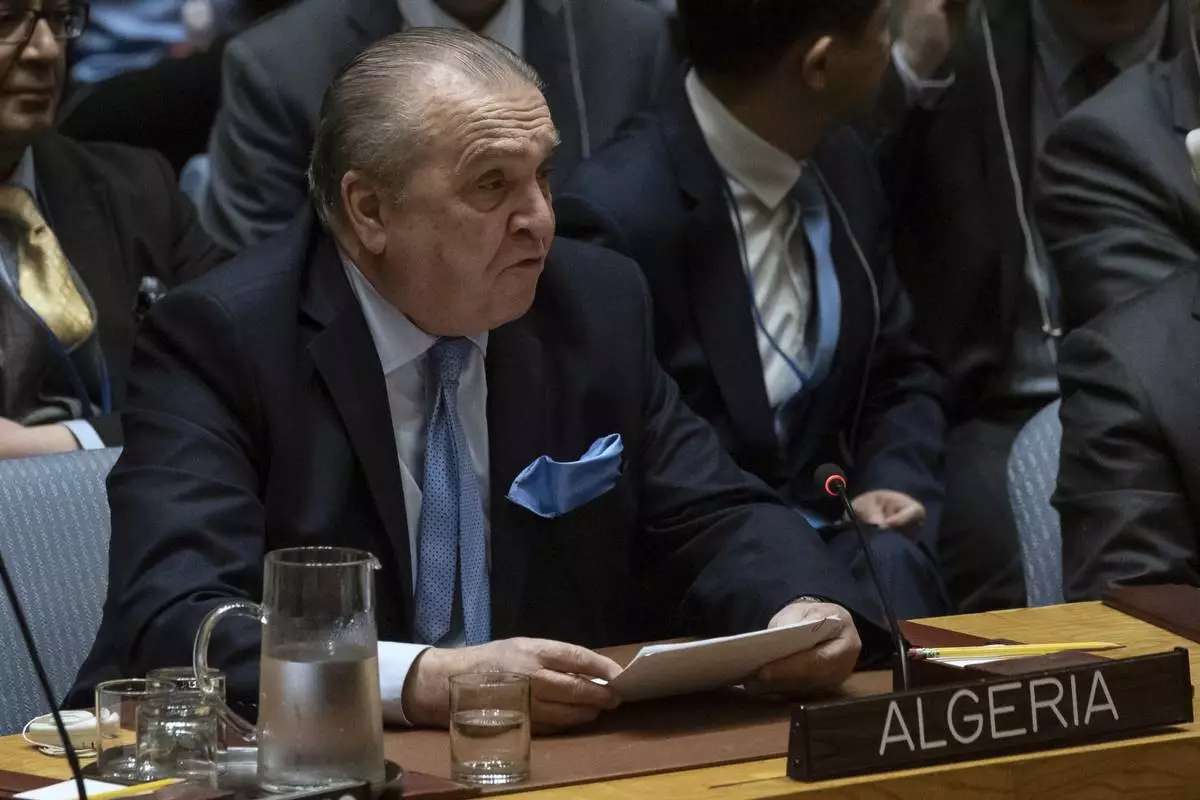
Algeria's Permanent Ambassador to the United Nations Amar Bendjama speaks during a Security Council meeting at United Nations headquarters, Thursday, April 18, 2024. (AP Photo/Yuki Iwamura)
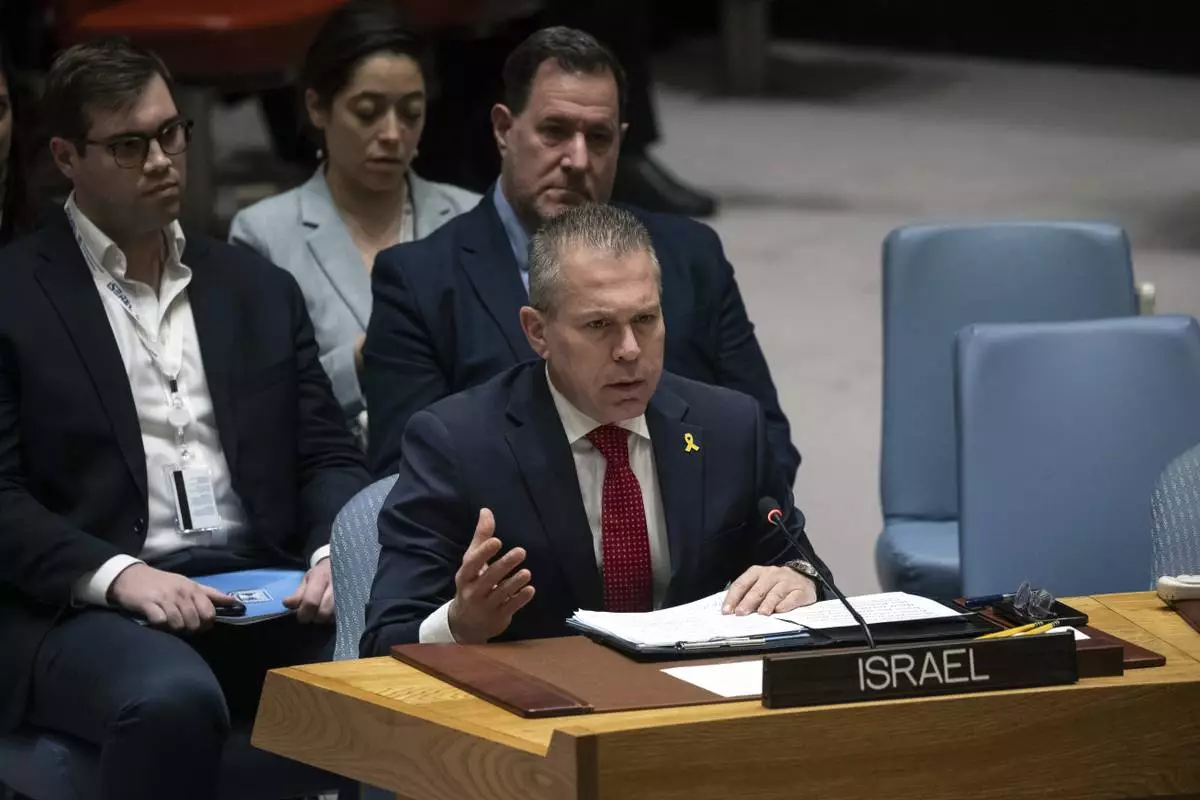
Israeli Ambassador to the United Nations Gilad Erdan speaks during a Security Council meeting at United Nations headquarters, Thursday, April 18, 2024. (AP Photo/Yuki Iwamura)
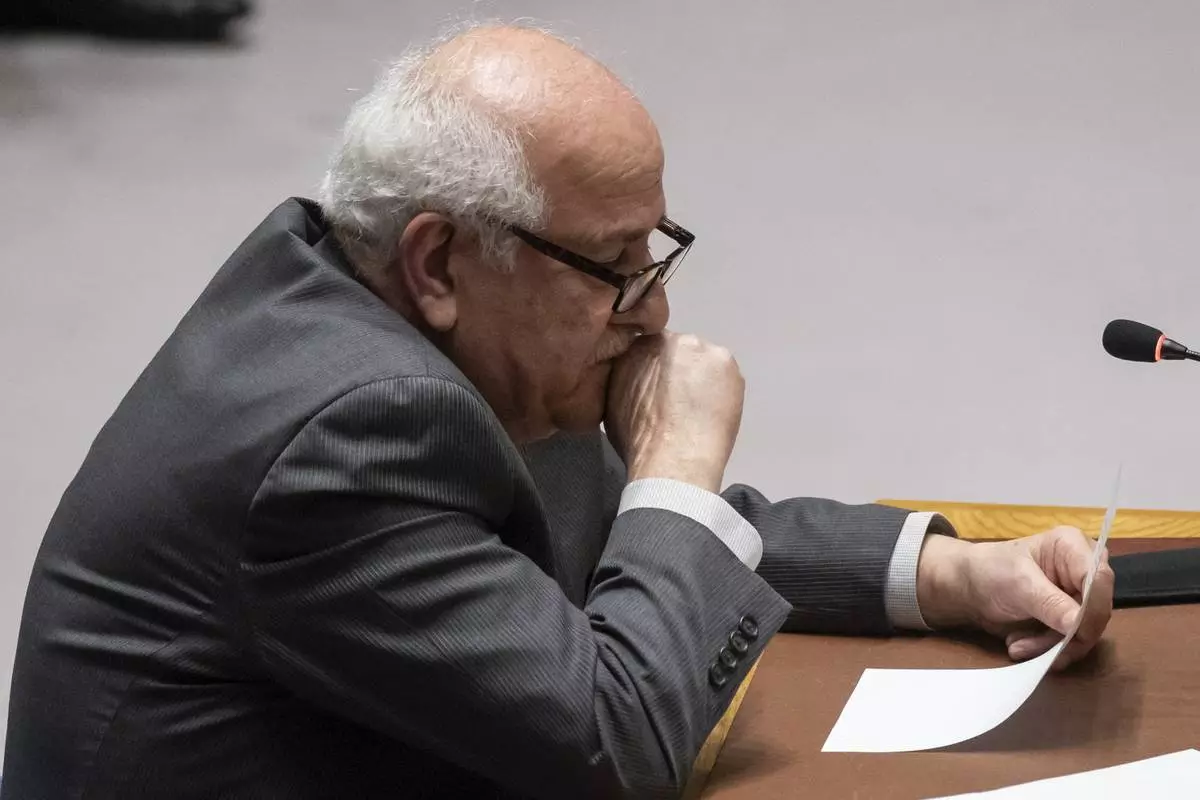
Palestinian Ambassador to the United Nations Riyad Mansour holds tears while speaking during a Security Council meeting at United Nations headquarters, Thursday, April 18, 2024. (AP Photo/Yuki Iwamura)
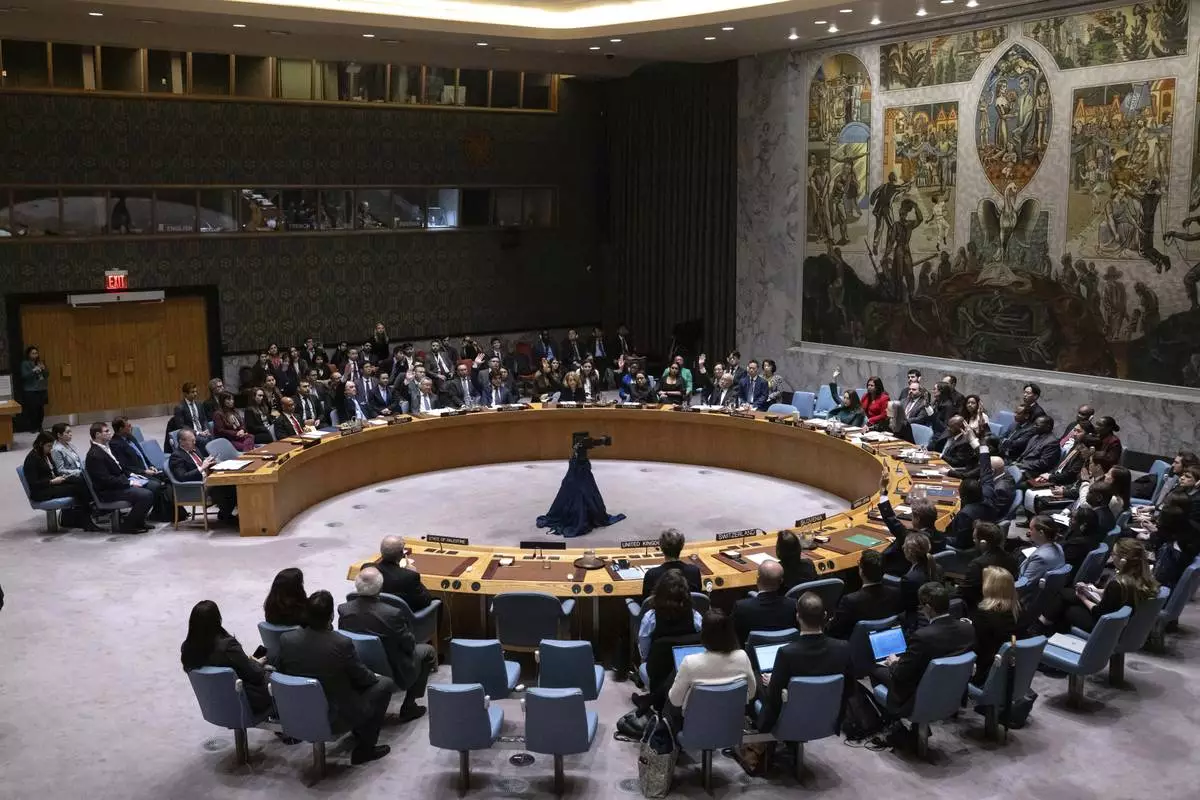
Representatives of member countries take votes during a Security Council meeting at United Nations headquarters, Thursday, April 18, 2024. (AP Photo/Yuki Iwamura)
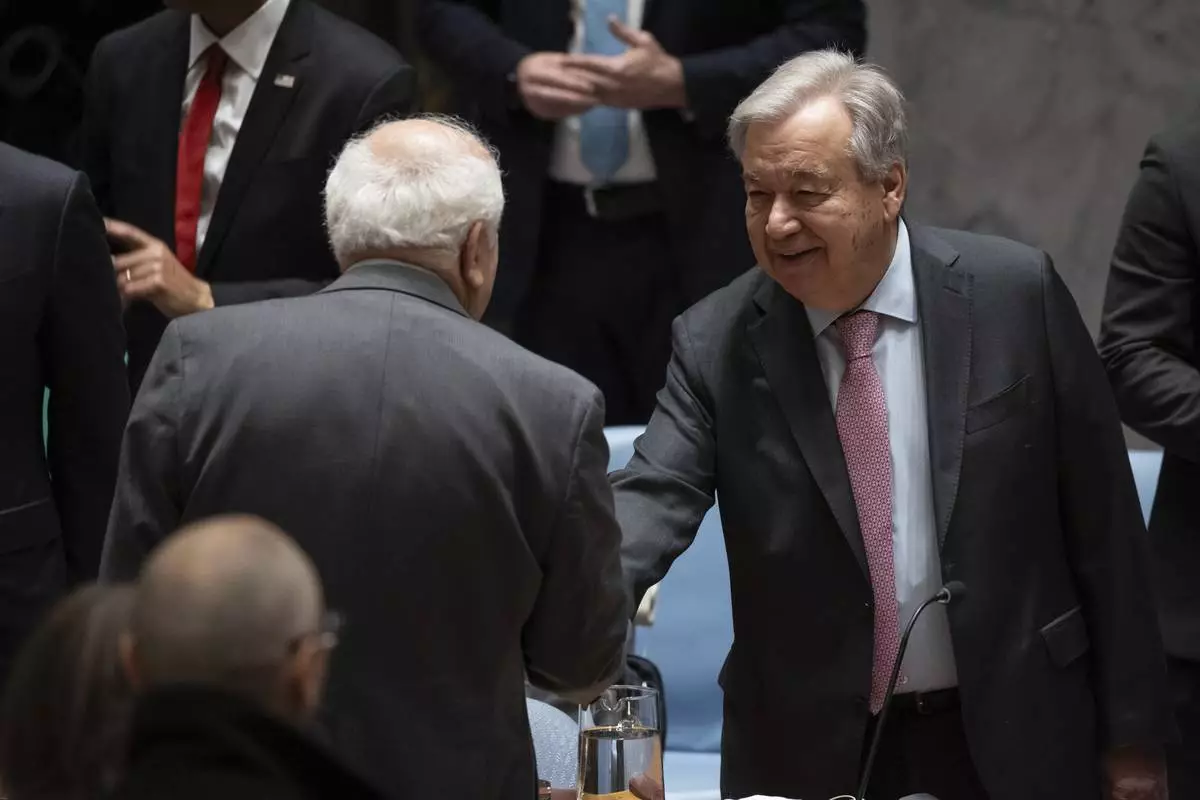
Palestinian Ambassador to the United Nations Riyad Mansour, left, and United Nations Secretary-General Antonio Guterres speak before a Security Council meeting at the United Nations headquarters, Thursday, April 18, 2024. (AP Photo/Yuki Iwamura)
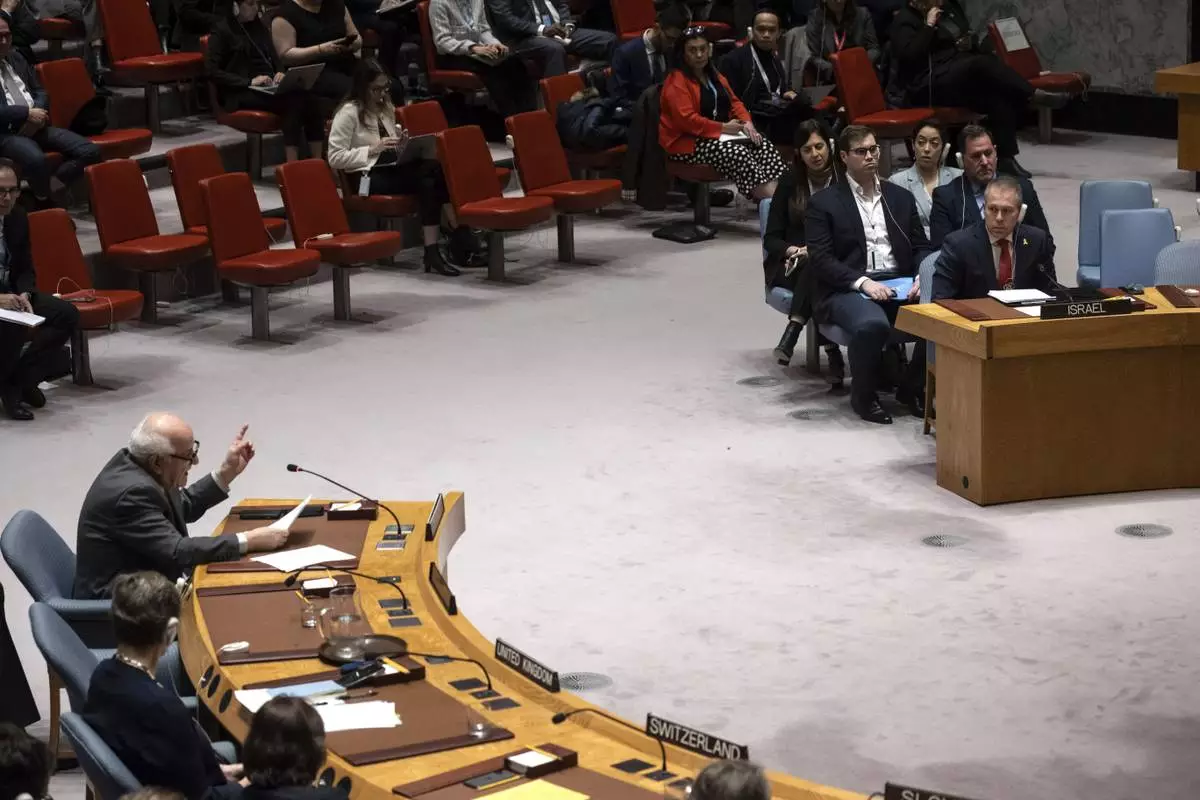
Palestinian Ambassador to the United Nations Riyad Mansour speaks during a Security Council meeting at United Nations headquarters, Thursday, April 18, 2024. (AP Photo/Yuki Iwamura)
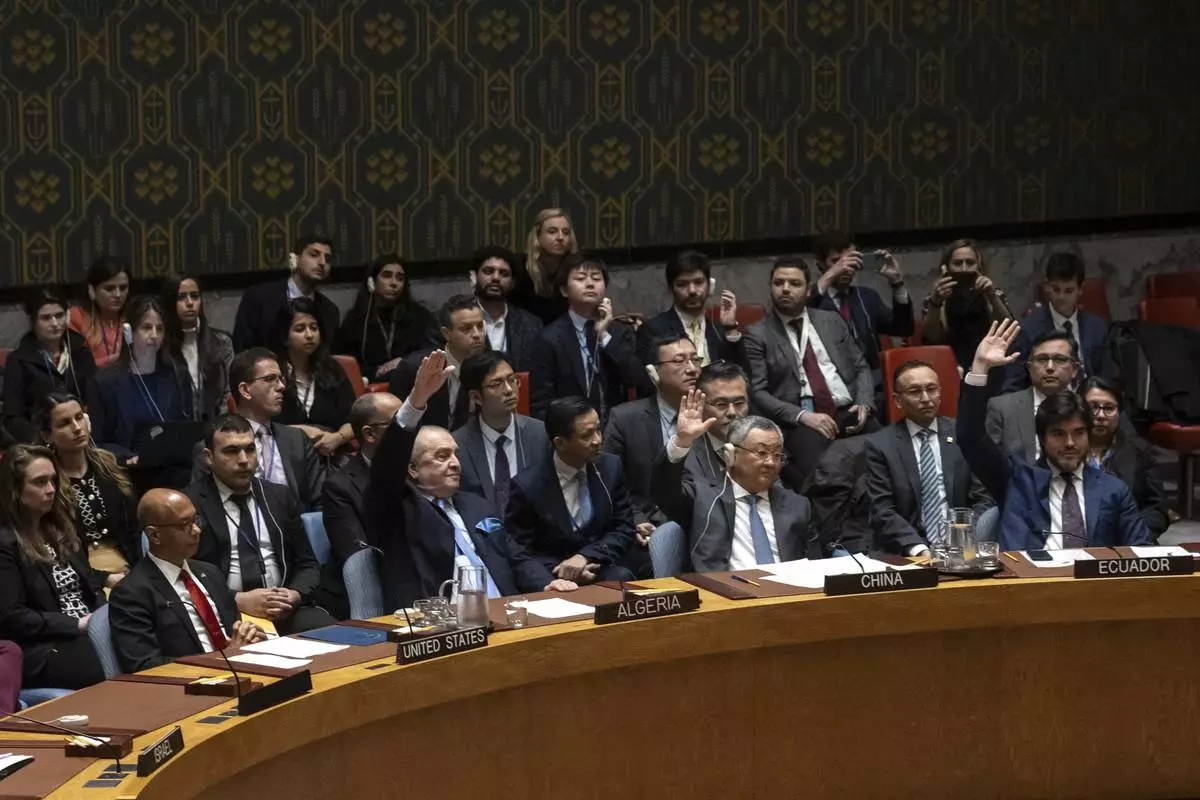
Representatives of member countries take votes during a Security Council meeting at United Nations headquarters, Thursday, April 18, 2024. (AP Photo/Yuki Iwamura)
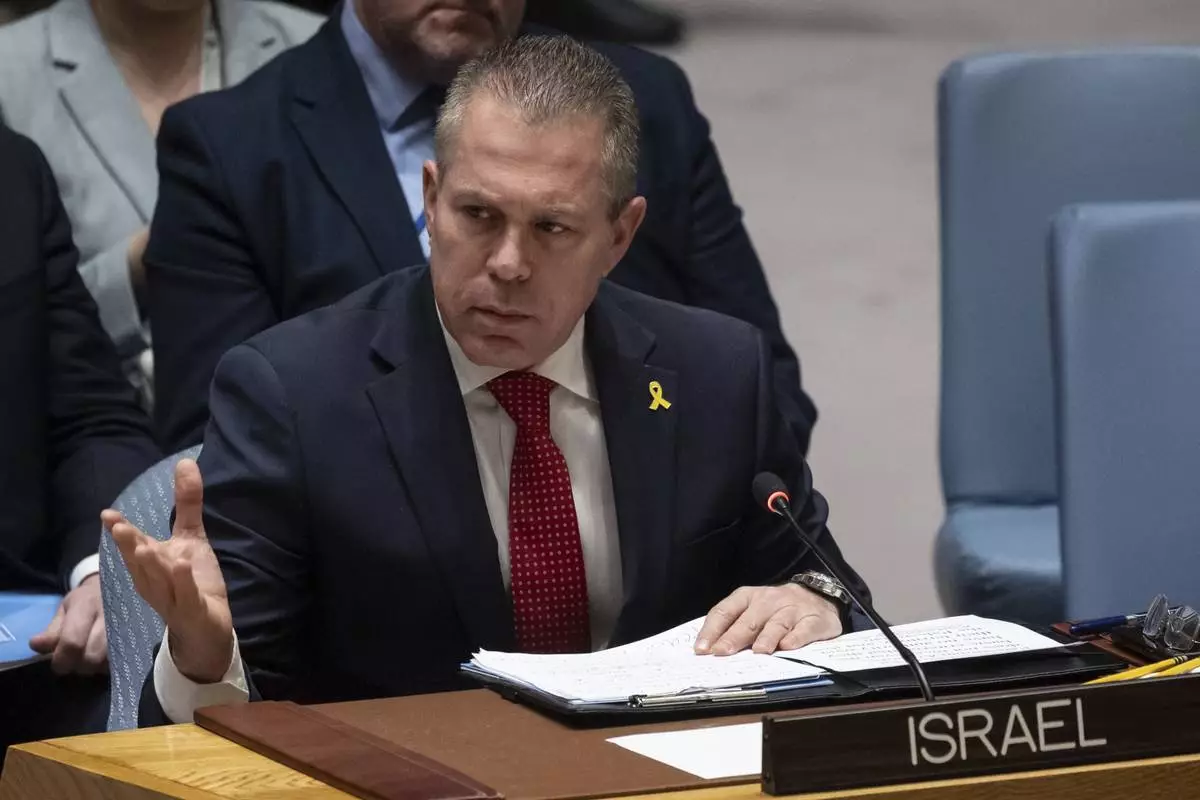
Israeli Ambassador to the United Nations Gilad Erdan speaks during a Security Council meeting at United Nations headquarters, Thursday, April 18, 2024. (AP Photo/Yuki Iwamura)
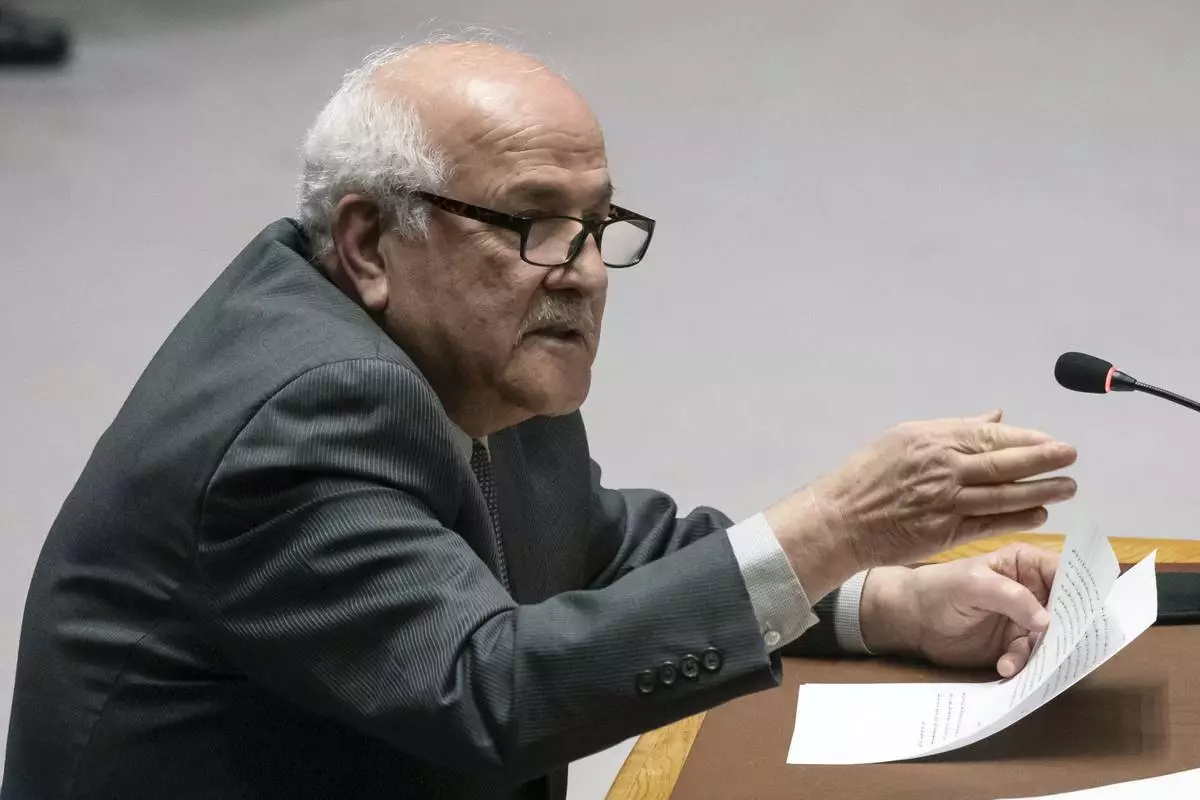
Palestinian Ambassador to the United Nations Riyad Mansour speaks during a Security Council meeting at United Nations headquarters, Thursday, April 18, 2024. (AP Photo/Yuki Iwamura)
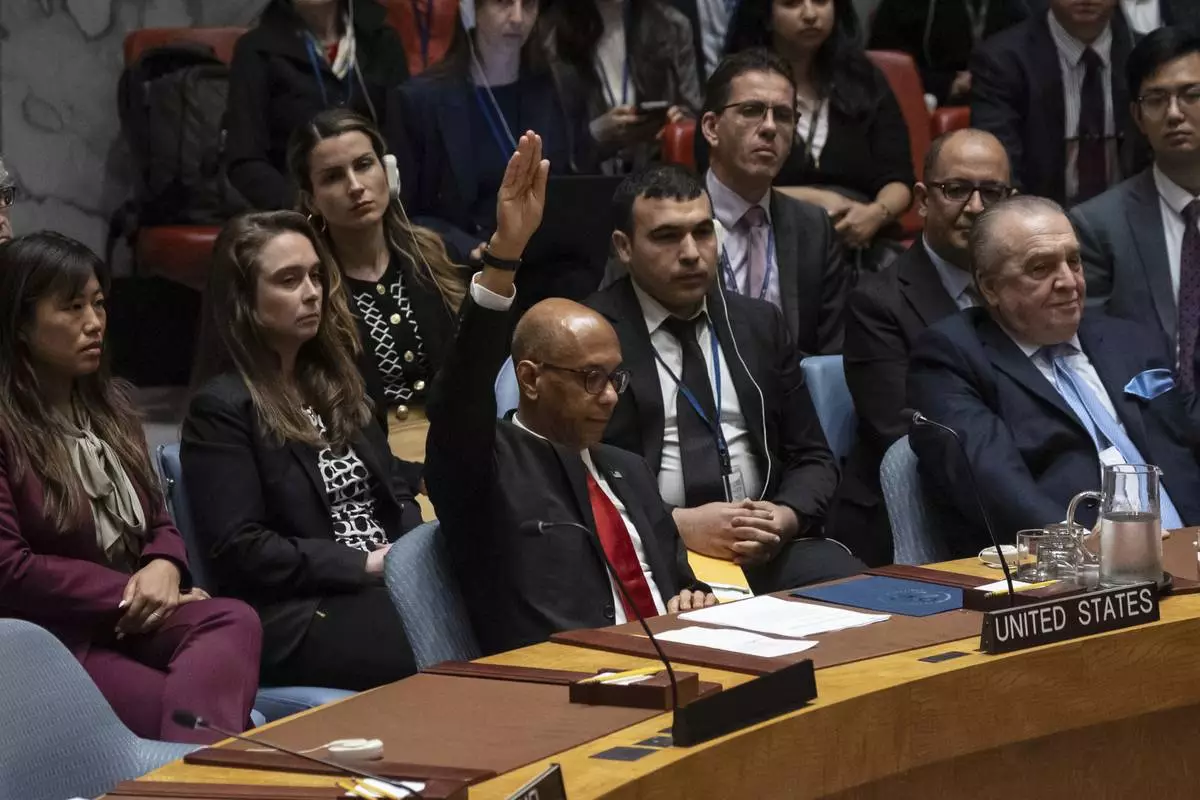
U.S. Deputy Ambassador Robert Wood votes against resolution during a Security Council meeting at United Nations headquarters, Thursday, April 18, 2024. (AP Photo/Yuki Iwamura)



















